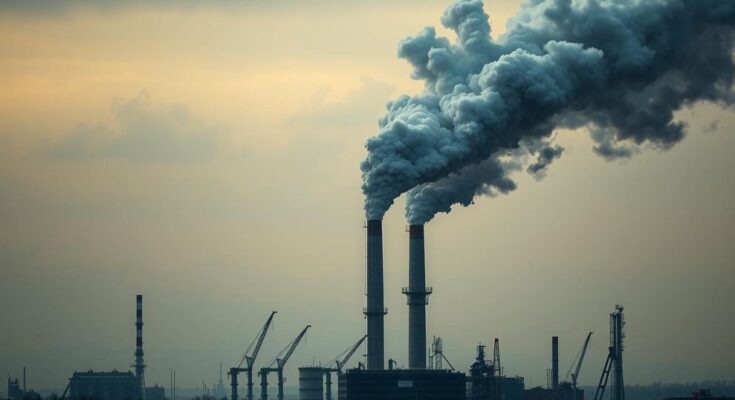The 2024 World Air Quality Report identifies Ghana, Nigeria, Chad, and Rwanda among the world’s most polluted countries, highlighting severe air quality issues. Chad leads with a PM2.5 level of 91.8 µg/m³, while Ghana’s levels have increased sharply to 35.8 µg/m³. Millions are at risk due to air pollution, which causes numerous health complications and economic costs. Urgent action is required to combat this crisis.
The 2024 World Air Quality Report has highlighted alarmingly high pollution levels across Africa, with nations such as Ghana, Nigeria, Chad, and Rwanda ranking among the most polluted globally. The findings emphasize the ongoing air quality crisis that poses severe risks to public health, affecting millions of people.
Chad leads the world’s pollution rankings, exhibiting a striking PM2.5 concentration of 91.8 µg/m³, significantly exceeding the World Health Organization’s (WHO) recommended limit of 5 µg/m³. Nigeria is ranked 11th with a level of 40.1 µg/m³, while Rwanda and Ghana follow at 9th and 14th place with PM2.5 levels of 40.8 µg/m³ and 35.8 µg/m³ respectively. PM2.5 particles are particularly harmful as they can penetrate deeply into the lungs and bloodstream, causing severe health issues.
According to data from the University of Chicago’s Air Quality Life Index (AQLI), air pollution is currently reducing the lifespan of individuals in highly polluted regions by an average of 2.7 years. In Ghana alone, it was estimated that 28,000 deaths are caused annually by air pollution, with alarming global statistics showing that air pollution resulted in 8.1 million deaths worldwide in 2021.
In Ghana, air pollution has reached seven times the WHO’s safe limit, marking a troubling increase in air quality deterioration. Accra is noted as the 16th most polluted capital city globally, recording an annual PM2.5 level of 36.3 µg/m³, while Kumasi emerged as Ghana’s most polluted city, at 39.5 µg/m³. Since 2022, pollution levels in Ghana have escalated from 30.2 µg/m³ to 35.8 µg/m³, as it rose from the 27th to the 14th position in global pollution rankings.
Africa is grappling with significant air quality issues, with five of the world’s top ten polluted nations located on the continent. The report indicates that only 24 out of 54 African nations provide air quality data due to insufficient monitoring infrastructure. Furthermore, a significant proportion of African cities reported PM2.5 levels far exceeding WHO guidelines, while serious data gaps persist, as evidenced by the absence of Lagos in the rankings.
Air pollution in Ghana represents a pressing public health crisis, causing a death approximately every 19 minutes and leading to a potential monthly toll of 2,333 lives. The economic implications are also profound, with estimates projecting a potential cost of $137.8 billion by 2040 if the situation remains unaddressed. Exposure to PM2.5 is associated with various health issues, including respiratory illnesses and cardiovascular conditions.
Despite only 17% of global cities meeting WHO air pollution standards, some countries manage to maintain cleaner air, with Australia, Bahamas, and New Zealand reported as the cleanest in 2024. As air quality deterioration continues in Africa, rapid urbanization and industrial emissions are identified as key contributing factors.
To combat the worsening air quality, experts advocate for stricter regulations on vehicle emissions, increased investment in renewable energy, expanded air quality monitoring infrastructure, and the implementation of stringent anti-burning policies. As Ghana appears in the top 15 most polluted nations, immediate action is crucial to avert a worsening crisis in air quality.
The findings of the 2024 World Air Quality Report underscore a significant and escalating air pollution crisis in Africa, with Ghana, Nigeria, Chad, and Rwanda prominently featured among the most polluted countries. The alarming PM2.5 levels reveal severe health and economic repercussions, necessitating urgent and robust interventions to enhance air quality and mitigate public health risks. Experts advocate for substantial policy reforms and investments to address this growing threat.
Original Source: www.myjoyonline.com




